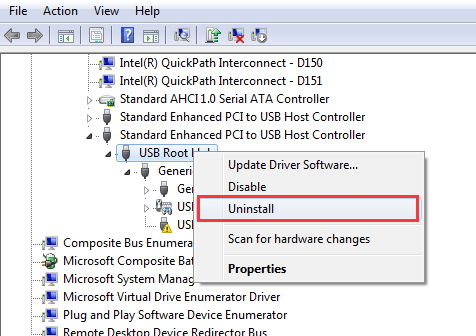

- Virtual usb bus enumerator driver serial#
- Virtual usb bus enumerator driver drivers#
- Virtual usb bus enumerator driver driver#
- Virtual usb bus enumerator driver Pc#
- Virtual usb bus enumerator driver windows#
Windows also provides a generic kernel-mode class driver, Generic USBFN (GenericUSBFn.sys).
Virtual usb bus enumerator driver drivers#
Certain class drivers are included in Windows, such as MTP and IpOverUsb.
Virtual usb bus enumerator driver driver#
The class driver handle requests issued by user mode services, or it can forwards requests to USB function class extension (UFX) and its function client driver. Emulated host controller headersĪ USB function class driver implements the functionality of a specific interface (or group of interfaces) on the USB device. Emulated host controller programming guideĭeveloping Windows drivers for emulated USB devices (UDE). The UDE client driver communicates with Udecx by using a set of methods and event callback functions to handle device requests and notify the class extension about various events. The driver pair loads as the FDO in the host controller device stack. This driver is referred to as the UDE client driver.
Virtual usb bus enumerator driver Pc#
A mobile device can behave as a peripheral when it is connected to a PC, allowing you to transfer files between your PC and the mobile device. These controllers are common on mobile devices and allow for connections to PCs, as well as USB peripherals like keyboards and mice. IOCTL_USB_GET_PORT_CONNECTOR_PROPERTIESĪ USB driver for a dual-role controller can behave as a host controller or a function controller depending on the hardware to which it is connected.IOCTL_USB_GET_NODE_CONNECTION_INFORMATION_EX_V2.IOCTL_USB_GET_NODE_CONNECTION_INFORMATION_EX.IOCTL_USB_GET_NODE_CONNECTION_INFORMATION.IOCTL_USB_GET_NODE_CONNECTION_DRIVERKEY_NAME.IOCTL_USB_GET_NODE_CONNECTION_ATTRIBUTES.IOCTL_USB_GET_DESCRIPTOR_FROM_NODE_CONNECTION.USB client drivers receive these user-mode I/O control requests at the kernel level: User-Mode IOCTLs sent by applications and services IOCTL_INTERNAL_USB_UNREGISTER_COMPOSITE_DEVICE.IOCTL_INTERNAL_USB_SUBMIT_IDLE_NOTIFICATION.IOCTL_INTERNAL_USB_REQUEST_REMOTE_WAKE_NOTIFICATION.

Virtual usb bus enumerator driver serial#
These include export functions that the drivers can call, callback routines that the driver can implement, I/O requests that the driver can send to the Microsoft-provided USB driver stack, and various data structures that are used in those requests.įor the programming guide, see Universal Serial Bus (USB). The programming interfaces are used for developing drivers that interact with USB devices, host controllers, connectors. This reference section describes the driver programming interfaces that are included in the Windows Driver Kit (WDK).


 0 kommentar(er)
0 kommentar(er)
